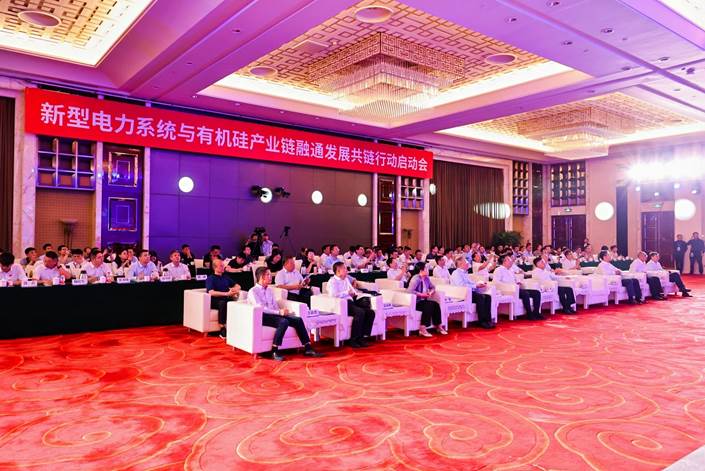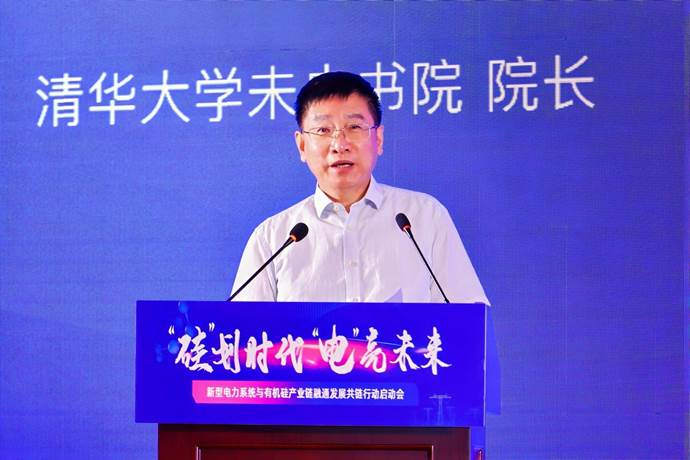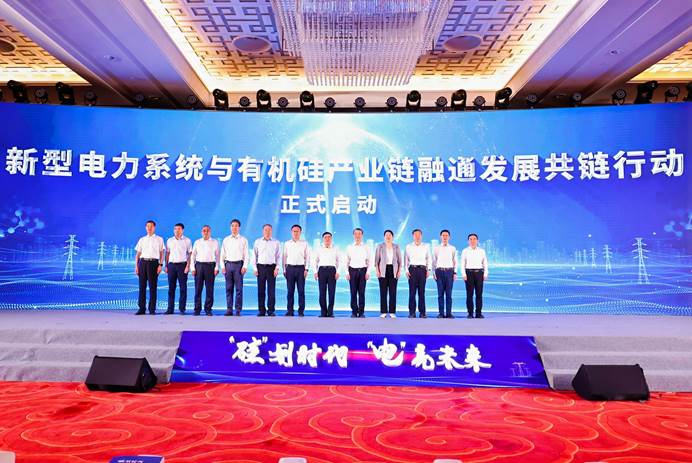On June 16, the launch meeting for the collaborative action to integrate the new type power system with the organosilicon industry chain was successfully held in Beijing. Over 100 participants attended, including representatives from the State-owned Assets Supervision and Administration Commission (SASAC), China Federation of Industrial Economics, State Grid Corporation of China, Sinochem Holdings Corporation, Tsinghua University, and various enterprises from both industry chains. The event was organized by the China Electric Power Research Institute and China BlueStar (Group) Co., Ltd., with Tsinghua University serving as a co-organizer.

The collaborative action aims to implement General Secretary Xi Jinping’s important directives on modern industrial system construction and to fulfill national strategic requirements regarding industry chains. The State Grid and Sinochem have been designated by SASAC as the lead units for the new type power system and organosilicon industry chains, respectively. Under SASAC’s guidance, they will leverage central enterprises’ roles in facilitating the integration of these chains, creating a platform for cooperation and communication, promoting a smooth flow of the industry and supply chains, and actively exploring the establishment of a new pattern where central enterprises lead, high-quality small and medium-sized enterprises support, and large, medium, and small enterprises engage in orderly competition and cooperation for integrated development.

Professor Liang Xidong from Tsinghua University, the chief engineer for the first batch of the industry chain’s R&D project on “Composite Insulators with Long Service Life,” spoke as a representative of the university at the launch. He emphasized that under the national “dual carbon” strategy, the new type power system is leading a profound transformation of China's energy system. Various transmission and transformation equipment, as the material foundation for the new type power system, must demonstrate long-term reliability, ease of maintenance, and availability under complex operating conditions. As a fundamental component of transmission and transformation devices, silicone rubber composite insulators have effectively resolved the long-standing issue of large-area flashover that threatened grid safety, significantly supporting the innovative development of China’s power sector. China has become the first country internationally to primarily use organic external insulation in ultra-high voltage systems, placing it at the forefront globally. However, the composite insulators in long-term operation over the past decade face new challenges such as brittle fracture and premature aging. To address these issues, there is a need for innovative development mechanisms that deepen interdisciplinary integration and industry chain fusion. A complementary and collaborative approach among industry, academia, research, and application is required to yield fruitful cooperation between the power and organosilicon industries, contributing to the new type power system and energy framework.
In 1990, Tsinghua University successfully completed a key project assigned by the State Council, achieving the development of 110-500kV ultra-high voltage composite insulators, transferring the technology to domestic manufacturers, and continuing to delve into the research of composite insulator technologies. Tsinghua will work with various chain units to firmly implement the spirit of the 20th National Congress of the Communist Party, diligently advance, and actively promote the deep integration of industry chains, innovation chains, and talent chains, creating a new paradigm for cultivating high-level composite and young scientific talents, thereby contributing to the country's high-level technological self-reliance and strength.

Notable guests at the meeting included Shang Peng, Deputy Director of the Planning Development Bureau of SASAC; Xiong Meng, Secretary of the Party Committee of China Federation of Industrial Economics; Chen Guoping, Deputy General Manager of State Grid; Zhang Fang, Deputy General Manager of Sinochem; and Yu Xinjie, Party Secretary of EEA at Tsinghua University, who participated in the launch and signing ceremony for the collaborative action.

















 News & Events
News & Events